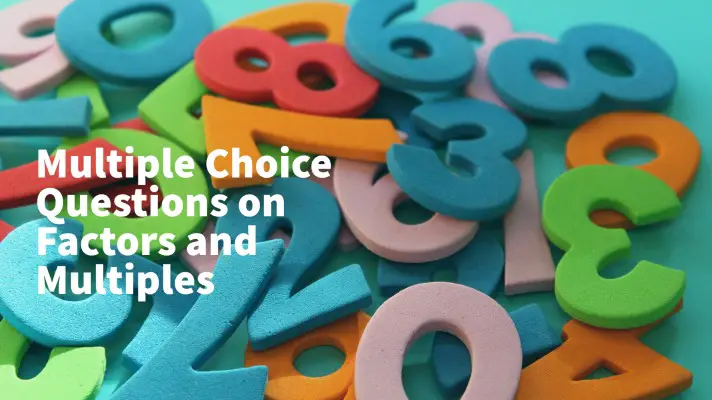In this article, I will display some Multiple-Choice Questions on Factors and Multiples.
There are some objective questions and answers along with explanations. Study these questions and answers to get a basic idea of factors and multiples. There is also a Quiz on this topic.
At the end of this article, you will see a “PDF Icon”. For downloading the pdf format of this article, you click on PDF downloadable button.
I think that if I raise some questions and then explain the answers, you will get more interest in studying/solving this chapter. It will be very helpful for me if you write to us your opinion in this regard by writing in the comment box.

Objective questions on factors and multiples
Here are the objective question:
Q1.Which number is neither prime nor composite?
Ans:1
Q2. Which is the lowest prime number?
Ans: 2
Q3. Name one even prime number.
Ans:2
Q4. Is 25684 divisible by 2?
Ans: Yes.
As in one’s place, there is 4 that is divisible by 2, hence the number 25684 is also divisible by 2.
Q5. Is 25684 divisible by 3?
Ans: No.
Add all the digits of the number.
Here the summation of the digits is- 2+5+6+8+4=25
Now, check whether 25 is divisible by 3 or not.
Here, 25 is not divisible by 3, hence the number 25684 is also not divisible by 3.
Q6. Is 25684 divisible by 4?
Ans: Yes
consider the numbers in tens and one’s place and then form the new number. Here, the new number formed is 84. Now, check whether this new number is divisible by 4 or not. In this case, 84 is divisible by 4; therefore 25684 is also divisible by 4.
Q7. Is 256843 divisible by 5?
Ans: No.
As in ones place there is 3, the number 256843 is not divisible by 5. If there is 5 or 0 in one’s place of the number, then the number will be divisible by 5.
Q8. Is 25684 divisible by 6?
Ans: No
We have checked already that 25684 is divisible by 2 but it is not divisible by 3. Therefore, 25684 is not divisible by 6.
If the number is divisible by both 2 and 3, then the number will be divisible by 6 also.
Q9. Is 25684 divisible by 7.
Ans: No
Digit in ones place is 4.
The number formed by balance digits is 2568.
2568- (4*2)= 2560
Now, number in ones place is 0
The number formed by balance digits is 256.
256-(0*2)=256
256 is not divisible by 7. Therefore, 25684 is also not divisible by 7.
Q10. Is 25684 divisible by 8?
Ans: No
Form the new number considering the digits in hundreds, tens and ones place. Here, the new number is- 684.
Check whether this new number is divisible by 8 or not.
Here, 684 is not divisible by 8. Therefore, 25684 is also not divisible by 8.
Q11. Is 25684 divisible by 9?
Ans: No
A number will be divisible by 9 if the summation of all the digits is divisible by 9.
Here, the sum of all the digits is 2+5+6+8+4=25.
25 is not divisible by 9. Therefore, the number 25684 is also not divisible by 9.
Q12. Is 25684 divisible by 10?
Ans: No
If there is zero in ones place of a number, then the number will be divisible by 10.
Here, in ones place there is 4.
Therefore, 25684 is not divisible by 10.
MCQ Questions on Factors and Multiples
- Common multiples of 8 and 12 is ___.
- 24 ✔️
- 16
- 12
- 36
- Lowest common multiple of 12 and 16 is _____.
- 24
- 36
- 48 ✔️
- 60
- The common factors of 12 and 16 is __
- 3
- 4 ✔️
- 6
- 8
- The highest common factor of 36 and 48 is ____.
- 9
- 8
- 12 ✔️
- 16
- The lowest common factor of 36 and 48 is
- 2 ✔️
- 3
- 4
- 6
- The lowest common multiple of 36 and 48 is ___.
- 36
- 72
- 108
- 144 ✔️
- Full form of L.C.M is _____.
- Line construction method
- lowest common model
- lowest common multiple ✔️
- lower common multiples
- The full form of H.C.F is ____________.
- Higher common factor
- highest common factor ✔️
- higher common fraction
- highest common fraction
- The LCM of 24, 36, and 40 is ___.
- 90
- 180
- 360 ✔️
- none of these
- The HCF of 24,36, and 40 is _____.
- 2
- 4 ✔️
- 6
- 8
- The HCF of 32 and 40 is ____.
- 4
- 8 ✔️
- 10
- 12
- Which of the following is divisible by 6?
- 316
- 416
- 516 ✔️
- 616
The multiple-choice questions mentioned here are the basic questions from the chapter- “factors and multiples” that will help you in your exams. Now, let us jump into the quiz section.
Quiz on Factors and Multiples
Here is the Math Quiz on Factors and Multiples for you:
You may consider this as a test of 20 marks on factors and multiples. After completion of the test, you can check the answers and can come to know how much you are prepared.
Overview
For getting more clarity on Factors and Multiples, you may read the following text.
Definitions of terms with examples on factors and multiples
Factors
A factor(x) of a number(y) is an exact divisor of that number. It means that if ‘y’ is divided by ‘x’ then ‘x’ is a factor of ‘y’.
As 2,3,4 are the exact divisor of 12. Hence, these are the factors of 12.
Multiples
A number is the multiples of its factors. It means that ‘y’ is the multiple of ‘x’.
As 2 is the factor of 12, 12 is the multiple of 2.
When we multiply ‘X’ with some other numbers, the results give us multiple.
Therefore, multiples of ‘X’ are 2X,3X,5X,9X,….etc.
Similarly, multiples of 12 are: (12*2),(12*3),(12*4),(12*5),.. i.e. 24,36,48,60,….
Even numbers
All multiples of 2 are the even numbers. In other words, the numbers that can be divided by 2 are the even numbers.
Examples:- 2,4,6,8,10,12,14,16,18,20,22,24,…..etc.
Odd numbers
The numbers that are not divisible by 2 are the odd numbers. The numbers that you can’t pair are the odd numbers.
Examples:- 1,3,5,7.9.11,13,15,17,19,
Prime numbers
The numbers that have only two factors i.e. 1 and the number itself are the prime numbers.
Examples: 2,3,5,7,11,13,17,19,23,29,31, etc.
Composite numbers
The numbers that have more than two numbers factors are the composite numbers.
Examples- 4,6,8,10,12,14,16,18,20,22,etc.
Twin primes
Two consecutive odd prime numbers are twin primes. Examples: 3,5; 5,7; 11,13; 17,19; 29,31; 41,43; 59,61; 71,73.
Prime triplet
The three consecutive prime numbers that are differed by 2 are known as prime triplet. Examples: 3,5,7.
Co-primes
Two numbers that have no other common factor except 1 are known as co-primes. Examples: 2,3; 5,6; 4,15; etc.
Perfect numbers
Here is how to check whether the number is perfect number or not.
First, find out the factors of that number.
Then, add those factors.
If the summation of the factors = 2 * the number, then the number is the perfect number.
I hope that the Multiple-Choice Questions on Factors and Multiples along with explanations and quiz tests will help you in catching the concept. I will suggest that you read the explanations first and then re-appear for the test. Best wishes!


